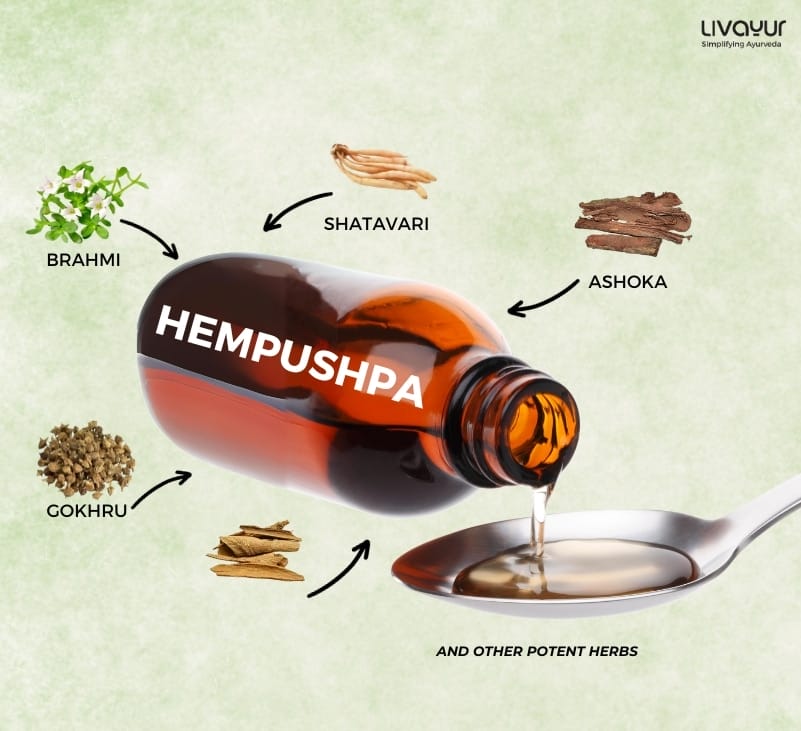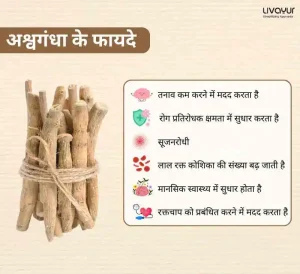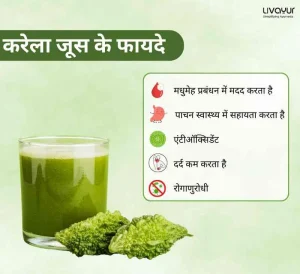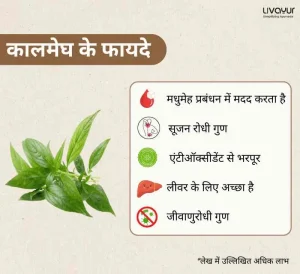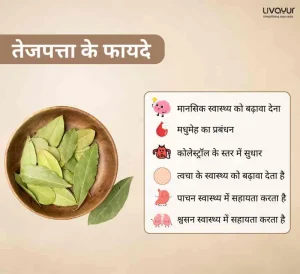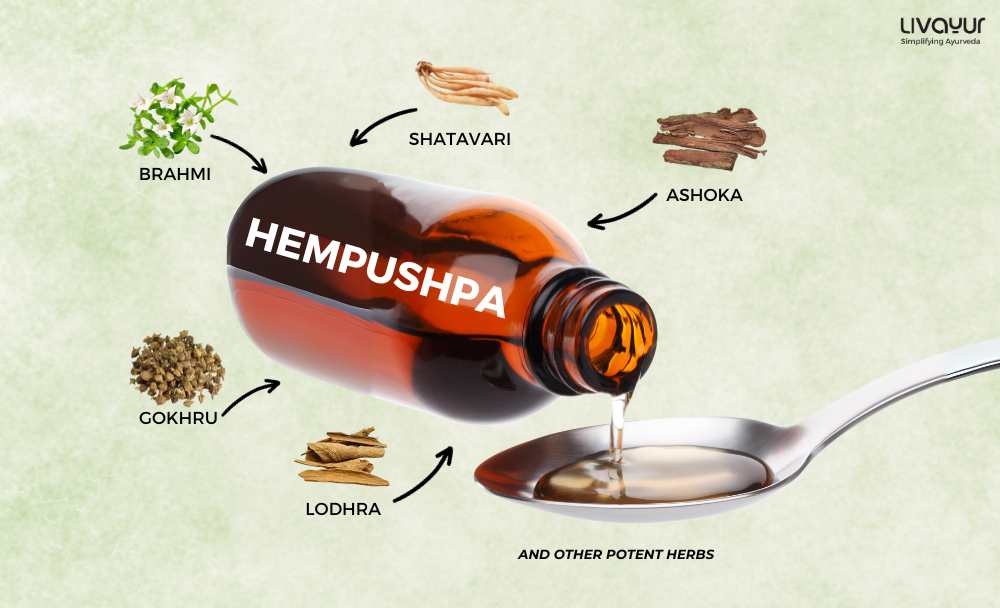
Hempushpa is a popular Ayurvedic tonic or syrup with a long history of use in traditional Indian medicine. It is primarily recommended as a female health tonic and is vastly believed to benefit women’s health.
Hempushpa syrup typically includes a combination of several herbs and natural ingredients such as Ashoka, Shatavari, Brahmi, Gokhru, and Lodhra, among others. The primary Hempushpa syrup usage is in the context of women’s health, for example, in fertility treatments, menstrual disorders, etc.
The syrup also has a variety of other pain-relieving applications. However, like every good thing, Hempushpa syrup also has some limitations. There are age limits on the use of Hempushpa, with most Ayurvedic practitioners advising against its use for children or senior citizens.
Ingredients of Hempushpa Syrup
Here are the major ingredients of Hempushpa Syrup as listed on the product packaging:
| Ingredient | Relevant Information |
| Lodhra | Sci. Name: Symplocos. Lodhra is a typical indigenous drug, which is used for the treatment of diarrhea, dysentery, bowel complaints, vaginal discharge, abortion, snake bite, etc. [1] |
| Manjistha | Sci. Name: Rubia Cordifolia. Manjistha is the most common Ayurvedic multi-pharmacological action drug, e.g., antidiabetic, antipyretic, anti-inflammatory, analgesic, antihistaminic, antimicrobial, immunomodulator, antiherpes, cosmetic ailments, menstrual disorder, cardio-gastro-hepatoprotective in nature. [2] |
| Anantamool | Commonly known as ‘Hemidesmus Indicus,’ ‘Anti-venom,’ ‘Lupeol,’ and ‘Indian Sarsaparilla.’ It possesses these properties – anti-inflammatory, antioxidant, analgesic, antipyretic, hepatoprotective, antileprotic, anti-acne, antimicrobial, anti-carcinogenic, antithrombotic, anti-hyperlipidaemic, anti-nociceptive, anti-venom and wound healing activity.[3] |
| Bala | Bala (Sida cordifolia Linn.), also known as Indian Ephedra, is a plant drug. It has been used in the various Ayurveda, Unani, and Siddha systems of medicine for time immemorial. It has good medicinal value and is helpful to treat diseases like fever, weight loss, asthma, chronic bowel complaints, and nervous system disease and acts as an analgesic, anti-inflammatory, hypoglycemic activities, etc. [4] |
| Gokshura | Gokshura (Tribulus terrestris Linn.) is a very revered herb of the Indian Ayurvedic system of medicine for the treatment of various kinds of diseases. Properties it has: antiurolithiatic, antimicrobial, antihelminthic, cardiotonic, anti-inflammatory, hypolipidemic, immunomodulatory, antispasmodic, analgesic, aphrodisiac, antidiabetic, anti-tumour, hepatoprotective, anticarious, antioxidant, CNS modulator properties. [5] |
| Shankhapushpi | Shankhpushpi is an Ayurvedic drug used for its action on the central nervous system, especially for boosting memory and improving intellect. [6] |
| Musli | Sci. Name: Chlorophytum borivilianum. It is an eminent medicinal plant of India and considered as a ‘white gold’ or ‘divya aushad‘ in Indian systems of medicine. [7] |
| Punarnava | Sci. Name: Boerhaavia diffusa. It is reported to possess anti-aging, disease prevention, and life-strengthening activities, which greatly influence disease burden and affordability/availability of healthcare worldwide. [8] |
| Ashwagandha | Sci. Name: Withania somnifera. Ashwagandha is a Rasayana of the Ayurveda system of medicines. It is a potent regenerative tonic possessing several pharmacological properties like neuroprotective, anti-stress, anti-arthritic, anti-tumor, analgesic, and anti-inflammatory. [9] |
| Vacha | Sci. Name: Acorus Calamus. Vacha is a traditional Indian medicinal herb. It treats various health ailments, including neurological, gastrointestinal, respiratory, metabolic, kidney, and liver disorders. [10] |
| Dhataki / Dhaiphool | Sci. Name: Woodfordia fruticosa (L.) Kurz., known as Dhataki, is an essential medicinal plant in Ayurveda. Its leaf is used to treat ulcers, rheumatism, fever, hemoptysis and as a disinfectant.[11] |
| Daruhaldi | Sci. Name: Berberis aristata. Its pharmacological properties include antimicrobial, anti-inflammatory, analgesic, antipyretic, hepatoprotective, immunomodulatory, and cardiotonic activity. [12] |
| Gambhari | Sci. Name: Gmelina arborea. Commonly known as ‘Gamhar.’It is used as Medha (Intellect Power), Keshya (Hair Tonic), and Rasayana (Rejuvenator) in Ayurveda. [13] |
| Nagarmotha | Sci. Name: Cyperus Rotundus. It possesses various pharmacological activities such as diuretic, carminative, emmenagogue, anthelminthic, analgesic, anti-inflammatory, anti-dysenteric, and antirheumatic activities. [14] |
| Shatavari | Sci. Name: Asparagus racemosus (A. racemosus) belongs to the family Liliaprevention of AIDS, treatment of nervous disorders, inflammation, commonly known as Satawar. Notable properties: Ulcer healing, prevention of AIDS, treatment of nervous disorders, inflammation, and certain infectious diseases. [15] |
| Ashoka Bark | Botanical name: Saraca Asoca. It has antibacterial, anti-fungal, oxytocic, uterotonic, anticancer, anti-progestational, anti-estrogenic, antiinflam- matory, and anti-oxidant activity. [16] |
Uses And Benefits Of Hempushpa
Although Hempushpa syrup benefits are widely recognized in Ayurvedic medicine, more research is needed to gain acceptance in conventional care. Nevertheless, abundant evidence confirms the benefits of some of the primary ingredients in this herbal formulation. Some of these benefits include:
1. To regulate female reproductive health
Primary Benefits: The most common of all Hempushpa uses is for general reproductive health for women, to regulate and balance the female reproductive system. It is believed to help maintain healthy menstrual cycles, reduce menstrual discomfort, and support overall reproductive health.
2. For fertility treatment
Primary Benefits: Like many other Hempushpa benefits, its fertility-boosting effects may be linked to ingredients such as Shatavari. These herbs are proven to encourage healthy ovulation and folliculogenesis, although their precise mechanism of action needs to be clearly understood [15]. This could be linked to reduced inflammation in the sexual organs and a bit in testosterone levels.
3. For balancing hormones
Primary Benefits: The herbs in Hempushpa, such as Shatavari and Ashoka, are traditionally used in Ayurveda to promote hormonal balance in women. This is why Hempushpa syrup is often prescribed for endocrinal disorders that affect hormone levels, such as PCOS.
4. Treatment for menstrual disorders
Primary Benefits: Hempushpa is often used to alleviate symptoms associated with menstrual disorders, such as menorrhagia or heavy bleeding, irregular periods, and menstrual cramps. These Hempushpa benefits may also be linked to Ashoka and Shatavari, as research suggests they exhibit uterotonic, anti-estrogenic, and anti-inflammatory effects[16].
5. Boosts vitality and libido
Primary Benefits: Hempushpa is believed to enhance energy levels and provide a general sense of well-being. It may be taken as a rejuvenating tonic to combat fatigue and weakness. This is supported by some studies, which show that ingredients like Gokhru (Gokshura) can improve sexual arousal and desire [17].
6. Aids digestive health
Secondary Benefits: This Ayurvedic syrup is often recommended for gastrointestinal problems as some herbs in Hempushpa traditionally support healthy digestion. It is believed to improve digestion, alleviate indigestion and promote overall digestive wellness.
7. Used as a general health tonic
Primary Benefits: Hempushpa syrup is often consumed as a general health tonic for women. It is believed to nourish the body, boost immunity, and promote overall wellness, as many herbs used in the formulation are associated with women’s health.
8. Fights infections
Secondary Benefits: Herbal ingredients like Ashoka and Lodhra also exhibit antimicrobial effects, making them helpful for immune support and lowering the risk of numerous infections. Studies show that Ashoka is particularly effective at inhibiting the growth of bacteria such as Pseudomonas aeruginosa and Salmonella, respectively [18].
How to use Hempushpa
Hempushpa can be consumed in the form of tablets and syrup.
Dosage of Hempushpa
Dosage of Syrup
As per the information available as Consumer Medicine Information on the packaging of Hempushpa Syrup:
‘Take 7 ml of Hempushpa syrup twice daily after food or as directed by the healthcare professional.’
Dosage of Tablets
As per the information available as Consumer Medicine Information on the packaging of Hempushpa Tablets:
‘Tablets should be consumed twice daily or as the healthcare professional directs.’
The dosage requirements can vary, depending on the underlying condition that is being treated, as well as your general health status.
Hempushpa Side Effects And Precautions
Side Effects:
Hempushpa is generally considered safe, with no recorded risk of side effects. However, these are some of the side effects that individuals might experience based on their health profiles:
- Gradual delay in periods
- Hormonal issues
- Pimple breakouts
- Mood swings
- Shorter duration of periods
- Cramps during period
- Digestion problem
Precautions:
- Ayurvedic physicians advise against the use of Hempushpa for children under the age of eighteen and aged adults.
- Younger girls should only intake Hempushpa as and if prescribed by a medical practitioner.
Price Chart for Hempushpa Syrup
| Product | Shop / Online Store | Price / Qty. |
| Rajvaidya Hempushpa Syrup | 1mg | ₹247/- per 170 ml |
| Generic Gopal Hempushpa Syrup | Amazon | ₹247/- per 170 ml |
| Hempushpa Antiseptic Syrup For Women | Flipkart | ₹199/- per 170 ml |
| Hempushpa Syrup | Apollo Pharmacy | ₹270/- per 170 ml |
Conclusion
Hempushpa is undoubtedly one of the most noteworthy Ayurvedic formulations to support women’s health and wellness, but more research is needed to explore its full potential. To get the best results from your treatment, make sure to talk to an Ayurvedic physician about the appropriate usage and dosage for Hempushpa as well as appropriate combinations.
FAQs
1. Can Hempushpa cause weight gain?
When used excessively and at a high frequency, it may cause weight gain in some women, but this is mainly associated with increased water retention.
2. What are the ingredients in Hempushpa?
Hempushpa formulation can vary and includes over 15 herbs. Still, some of the main ingredients include Lodhra, Manjith, Anantamul, Bala, Gokhru, Brahmi, Shankpushpi, Ashok, Musali, Shivlingi, Punarnava, Ashvagandha, Daruhaldi, Mulethi, Gand Nagarmotha.
3. Can we mix Hempushpa syrup with Chyavanprash churna?
Although made from natural ingredients, Ayurvedic formulations contain potent herbs and should only be used in the recommended dosage and combinations. Speak to an Ayurvedic physician before combining or using different products together.
Disclaimer:
The information provided here is for general information and is not meant to substitute any medical advice. Please consult your doctor for appropriate medical consultation.
References
- Lodhra- A Single Remedy For Different Ailments
- Manjistha is the most common ayurvedic multi-pharmacological action drug
- ‘Hemidesmus Indicus,’ ‘Anti-venom,’ ‘Lupeol,’ ‘Indian Sarsaparilla.’
- Bala (Sida cordifolia Linn.) that is also known as Indian Ephedra is a plant drug.
- Gokshura (Tribulus terrestris Linn.) is very revered herb of the Indian Ayurvedic system of medicine for treatment of various kinds of diseases.
- Shankhpushpi is an Ayurvedic drug
- A ‘white gold’ or ‘divya aushad’ in Indian systems of medicine.
- It is reported to possess antiaging, disease prevention, and life strengthening activities.
- Ashwagandha is a rasayana of Ayurveda system of medicines.
- Vacha is a traditional Indian medicinal herb.
- Dhataki, is an important medicinal plant used in Ayurveda.
- Berberis aristata has various pharmacological properties.
- Gmelina arborea, commonly known as ‘Gamhar.’
- Sci. Name: Cyperus Rotundus.
- Asparagus racemosus (A. racemosus) belongs to family Liliaceae and commonly known as Satawar.
- Asoka: Herbal Boon to Gynecological Problems An Overview of Current Research
- A randomized double-blind placebo-controlled trial to assess the safety and efficacy of Tribulus terrestris in women with hypoactive sexual desire disorder during their fertile years.
- Saraca asoca (Ashoka): A Review




